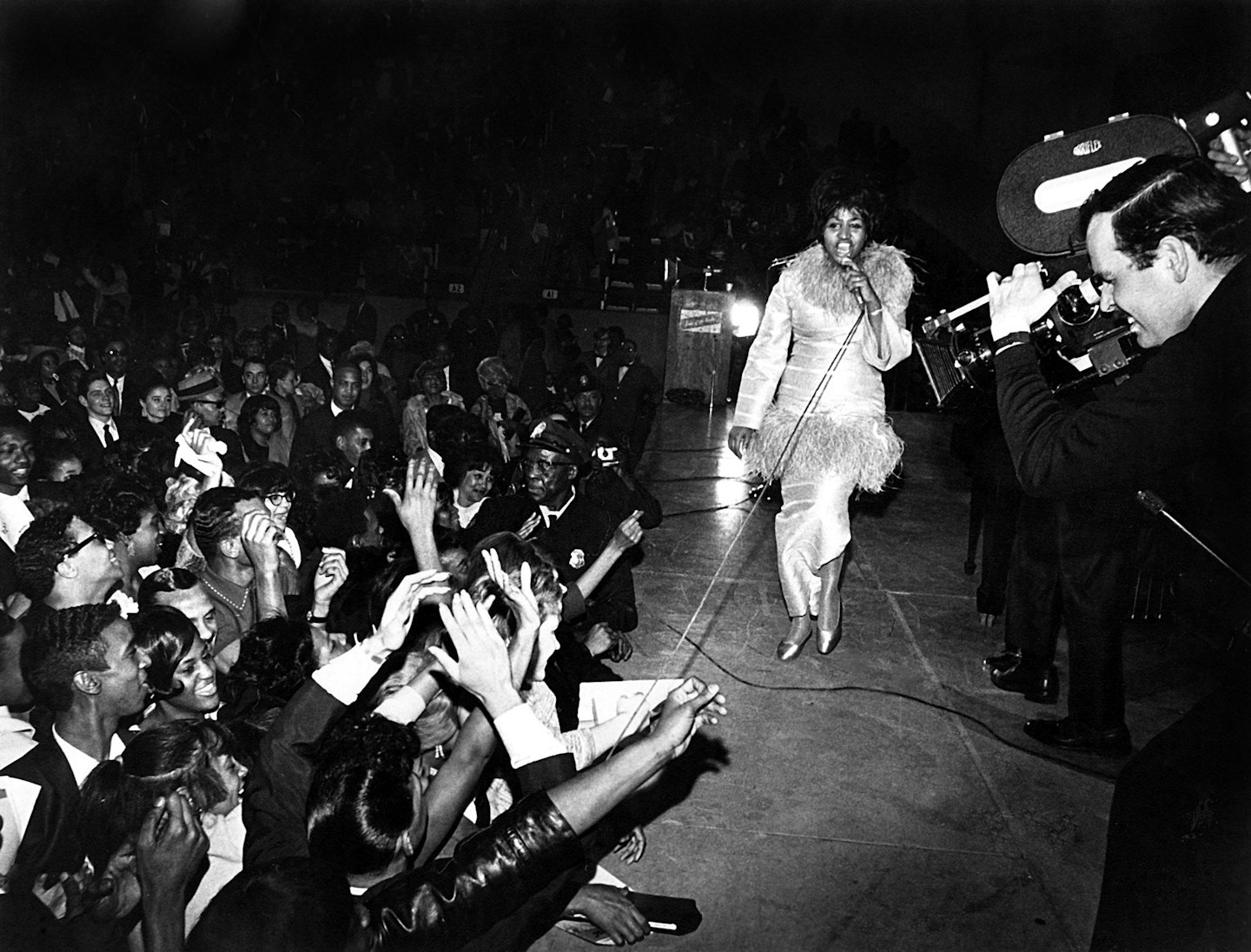It was a bitter day in April, 1968 when, five days after the assassination of Martin Luther King, Aretha Franklin stood before a sea of mourners. Heartbroken by the passing of an icon as well as her father’s dear friend, she took hold of her personal anguish and the collective pain of the crowd as she opened her mouth to sing. Performing Precious Lord, this was a moment of profound sadness but also one that secured her place in hearts and history, elevating her to the unthinkable achievement as voice of a people. It’s a role she would enact again and again, not least at the inauguration of the first black President in 2009.
But that moment in 1968 captures something at the very crux of Aretha Franklin, in which success and sadness were intimately entwined in her life. That same year she was given the honour of singing the national anthem at the Democratic National Convention, while just a few months after, her marriage came violently crashing down. Aretha’s achievements – this year showcased in the National Geographic biopic Genius and the upcoming film Respect – will always be legendary, but what perhaps makes them even greater is how they played out in the shadow, or perhaps in spite of, a lifetime of adversity and loss.

Daughter of a Preacher Man
Born in Memphis in 1942, Aretha was the daughter of a celebrated Baptist preacher and a nurse’s aide who loved to sing. As her dad’s career led the family across America to eventually settle in Detroit, he invited big names from the gospel world and filled the Franklin home with music. It sounded exciting, but behind it all Aretha’s mother was tiring of her husband’s repeated infidelities and, when Aretha was just six, her mother finally walked out. She would die three years later while Aretha and her siblings were brought up by her father’s secretaries and girlfriends.
To cope, Aretha threw herself into the one thing that brought her joy: music. Having taught herself to play piano by ear she became a child prodigy within her father’s church, where she would also reveal her extraordinary gospel voice tinged with a blues that spoke of the grief of a motherless daughter.
By 14, under her father’s management, Aretha had released her first album. It was an incredible achievement for a child, but one that had come from, or again in spite of, astonishing circumstances. For at age 12 Aretha had fallen pregnant by a school friend and given birth to a son, Clarence. By the time she was 16 she was a mother of two.
Nevertheless, her talents were getting noticed and both Motown boss Berry Gordy and Sam Cooke wanted to sign the young songstress. It was the label Columbia, however, that finally released her first hit Today I Sing the Blues in 1960 and prompted her to head to New York to find fame, entrusting her children to her grandmother, surely hoping her hardest years were behind her.
Did you know? After a harrowing experience of turbulence in 1982, Aretha developed an acute phobia of flying, meaning instead she always travelled by bus.
Getting Respect
Just on the cusp of success, Aretha was introduced in 1961 to Ted White, a Detroit pimp with a reputation for womanising and drinking. As she fell for his charms, he soon became her manager and husband. Having ‘seen something’ in Aretha, he was determined to make her a star and co-wrote songs with her. But he was also possessive, controlling and would physically attack her – sometimes in public. In fact, it’s thought the lyrics of her 1967 classic, I Never Loved A Man, spoke explicitly of her marriage:
“I don’t know why I let you do these things to me/My friends keep telling me that you ain’t no good.” In an ironic twist, that record became her first million- selling single.
But Aretha was determined she wasn’t going to be a victim and her next record made a powerful statement to that effect. Respect was originally recorded by Otis Redding as a polite request for harmony in his home, but in Aretha’s hands it was an anthem for gender and racial equality. To truly claim it as her own, she asked her sisters to sing backing vocals that reiterated her nickname – “Ree, Ree, Ree” – as well as adding a bridge that spelled out the R-E-S-P-E-C-T she was asking for, just in case anyone hadn’t got the message. The song commanded universal respect for her talents but also seemingly helped her find respect for herself. For shortly after she gave an interview to Time magazine – for whom she became only the second African American to appear on the cover – where she exposed her violent marriage and then separated from White. Within a few years she had so much respect for herself and the example she set that she walked off a Vogue photo shoot because she noticed all the other models were white – she wanted to prompt change.
A Bridge Over Troubled Water

The remaining years of Aretha Franklin’s life were also sprinkled with great highs and lows. She became the first woman admitted into the Rock and Roll Hall of Fame. She had 88 Billboard chart hits, received several honorary doctorates and won 18 Grammys – at one awards show she even stepped in for an indisposed Pavarotti to sing Puccini’s Nessun Dorma. She sang at the inauguration of three Presidents and was often described in terms that seemingly surpassed the possibilities of just one woman, such as Michelle Obama’s insistence that “Aretha helped define the American experience.” No wonder she even had an asteroid named after her.
But while these achievements played out, she also experienced immense sadness. In June 1979 she stepped off stage to learn her father had been shot by a burglar and had fallen into a coma. He survived five more years, during which time Aretha moved back to Detroit to care for him.
Soon after, she lost her brother (who’d become her manager) and both of her sisters to cancer. Sadly, it wouldn’t be long until that same misfortune visited her and in 2010, she was diagnosed with the pancreatic cancer that would sadly take her life in 2018.
Aretha Franklin will be remembered for her achievements, enormous as they were, but against the knowledge of her hardships, they can’t help but seem more unfathomable than ever.
